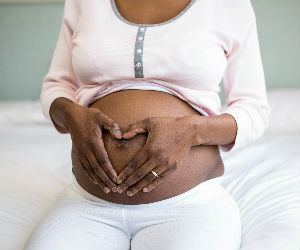For years, the term geriatric pregnancy was used to describe pregnancy in women 35 or older. We now describe this a bit more gently as advanced maternal age—
which is better. (And when we do hear someone refer to a geriatric pregnancy, we are quick to tell them that this term is a throwback that we literally want to throw back!)
The effects of age on pregnancy
What is ironic about the topic of pregnancy and age is the fact that a woman’s still vital and magical body can suddenly seem as archaic and wrong as the expression geriatric pregnancy. Think about it, a baby girl is born with 1-2 million eggs in her ovaries and by adolescence that number has decreased to 300,000 to 500,000. By the ripe age of 37, her ovaries hold only about 25,000 eggs and her chances of getting pregnant have decreased considerably. By that standard alone, she is, in fact, past her prime—while in most other ways, including the accumulation of wisdom and judgment, she is just reaching her peak.
There is much to be said about the value of time and life experience when it comes to being a good parent. Creating life when you are a bit older and better able to set a good example for your child seems like a good idea, right? And yet…as you age, your body makes it harder and more risky for you to do so. That doesn’t mean it is impossible. As long as you are ovulating, there is a chance you might find yourself expecting a child—in which case, it pays to be aware of the potential challenges you and your partner face.
Sweet revenge
There is a lot of information out there for older mothers about the health risks of a later-in-life pregnancy. But it isn’t all doom and gloom. What we want to enumerate here are some of the benefits of the situation, including the following:
- The “club” you belong to is large and growing! National Vital Statistics Reports tells us that birth rates for women in their 20s declined in 2015 and increased for women age 30 – 44, to an all-time high since the dawn of the baby boom era. In other words, women are delaying pregnancy in order to attain other things first—including higher education, more rewarding careers, and the knowledge and resources (think salary) that come with these. We may not be able to “have it all,” but we’re trying harder—and succeeding—at balancing personal and professional fulfillment with the responsibilities of motherhood.
- Older first-time mothers are statistically more likely to live longer than women who have their first child before they are 25.
- Older first-time mothers are less likely to smoke or pursue other deleterious habits that could compromise their own health and that of their child, both before birth and after. (This is just one benefit of that “older and wiser” thing.)
- The New York Times article, “Good News for Older Moms” by Perri Klass, M.D., April 3, 2017 referred to a study that looked at 4,741 families in Denmark. The study revealed that older mothers seemed to thrive better. They displayed greater flexibility in their psychological and cognitive states. They also showed greater tolerance of the demands placed on them by the mother-child relationship.
A bit of maturity
So, whatever term someone throws at you—even geriatric, for heaven’s sake—understand that you are well-suited for motherhood in many ways. As long as you work with your healthcare providers to stay well (and well-informed) throughout your pregnancy, you and your baby will live and thrive, enjoying the high quality of life you are able to provide. Look at it this way: Would you rather place your newborn baby in the care and safe-keeping of a 20-year-old or a 36-year-old? When it comes to the cognitive, emotional, social, and motor development of your precious child, you want to bring your A game…and a bit of maturity is a big plus.
